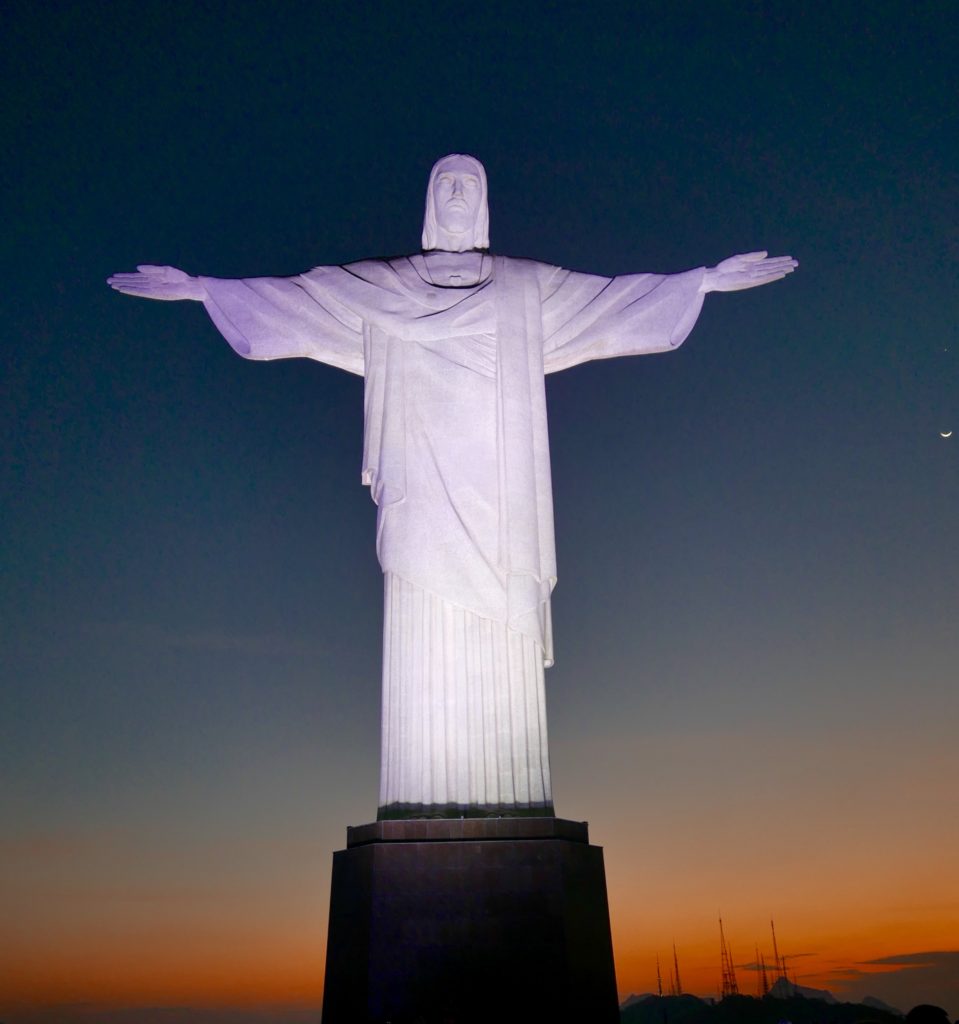Introduction
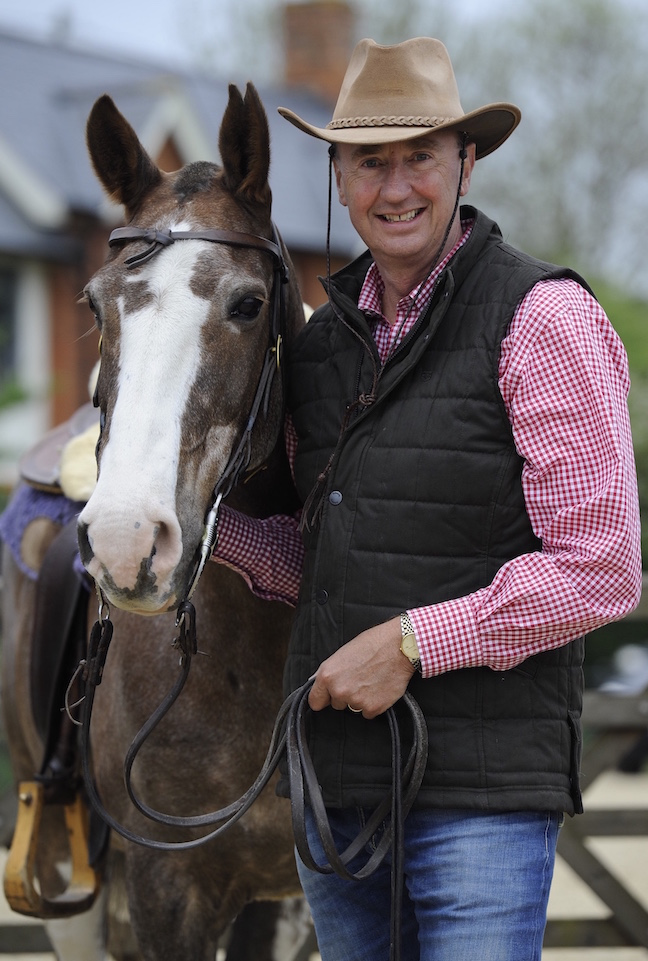 No one was more surprised than me when I was asked to commentate on equestrianism in the Olympics. I had never ridden before, or ever wanted to. Eighteen months ago, my BBC boss ‘phoned to tell me that I would not be continuing my archery coverage in Rio. ‘But’, he continued, ‘I understand your wife has a horse!’ And that was it.
No one was more surprised than me when I was asked to commentate on equestrianism in the Olympics. I had never ridden before, or ever wanted to. Eighteen months ago, my BBC boss ‘phoned to tell me that I would not be continuing my archery coverage in Rio. ‘But’, he continued, ‘I understand your wife has a horse!’ And that was it.
Now I am on the road to Rio, have completed my first broadcasts and have even taken up riding. This charts (from bottom to top) my journey from start to finish.
The End of the Journey
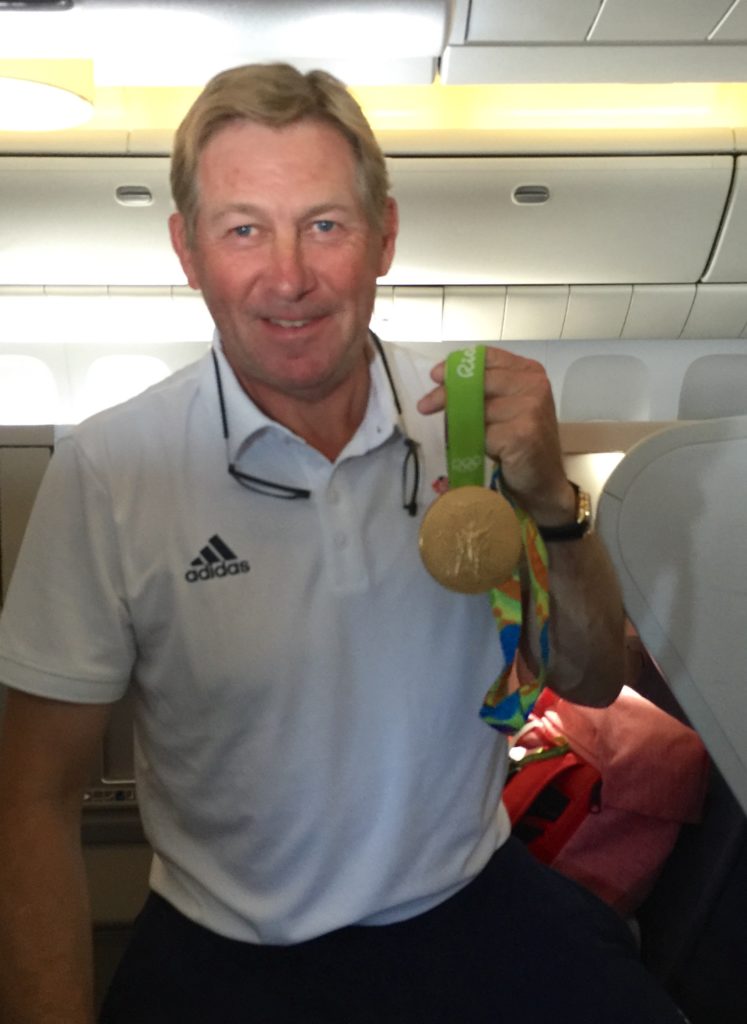 Back home already and this amazing Olympic adventure is over. It ended on a wonderful and rather unexpected high, too, with Nick Skelton winning a gold medal in the individual showjumping final. He is the first Brit ever to do so, and at 58 the oldest GB gold medallist since 1908.
Back home already and this amazing Olympic adventure is over. It ended on a wonderful and rather unexpected high, too, with Nick Skelton winning a gold medal in the individual showjumping final. He is the first Brit ever to do so, and at 58 the oldest GB gold medallist since 1908.
It was a different commentary to Charlotte’s. Her victory was in the altogether calmer atmosphere of dressage, although the moment her score appeared on the screen was highly dramatic. Skelton’s was in the mad dash of a jump-off in which he went first and rode brilliantly. When the final rider of the 6 knocked a pole down on the second to last, we were able to shout that it was a gold for Great Britain. Again it was passionate and emotional and I count myself very lucky to have done it twice in 5 days.
Nick was on my flight home, along with athletes from all over the world. Some were winners, others not. But they all shared the same glow of having been involved in something very special. Nick was sitting with the proud owners of Big Star and they were clearly in the process of drawing up the guest list for a massive celebration. They reminded me we had met two years ago, at the start of all of this. It was a lovely way for it all to end.
Shortly after this BBC team photo was taken outside the Tims’ shed, we convened on Barra Beach for a farewell. Chris Hoy was there, in excellent spirits. John Inverdale, too, who I have known for a very long time and am truly disappointed with much of what I have read about him this past week. If I was slaughtered every time I looked for my next interviewee while broadcasting live at the end of a Test match, I’d have been forced out long ago. At least his family has now arrived for a break and he deserves one, in every sense.
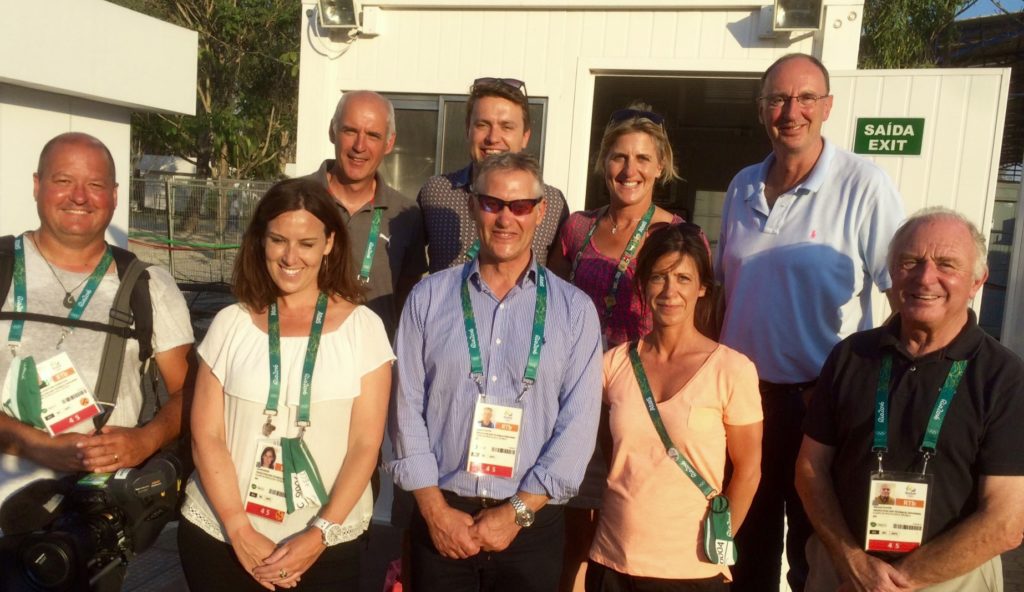 I had a note of thanks from my boss and I responded by telling him that I expect to be able to defend my two golds and the silver in Tokyo 2020. I will leave him some wriggle room, but I reckon I have his agreement in writing. I would love to do all of this again. It has been a proper lesson in working as a team; and a huge team at that. The logistics of getting reporters, producers, engineers and TV crew to every location in Rio was immense. But it worked and clearly the coverage drew huge audiences at home.
I had a note of thanks from my boss and I responded by telling him that I expect to be able to defend my two golds and the silver in Tokyo 2020. I will leave him some wriggle room, but I reckon I have his agreement in writing. I would love to do all of this again. It has been a proper lesson in working as a team; and a huge team at that. The logistics of getting reporters, producers, engineers and TV crew to every location in Rio was immense. But it worked and clearly the coverage drew huge audiences at home.
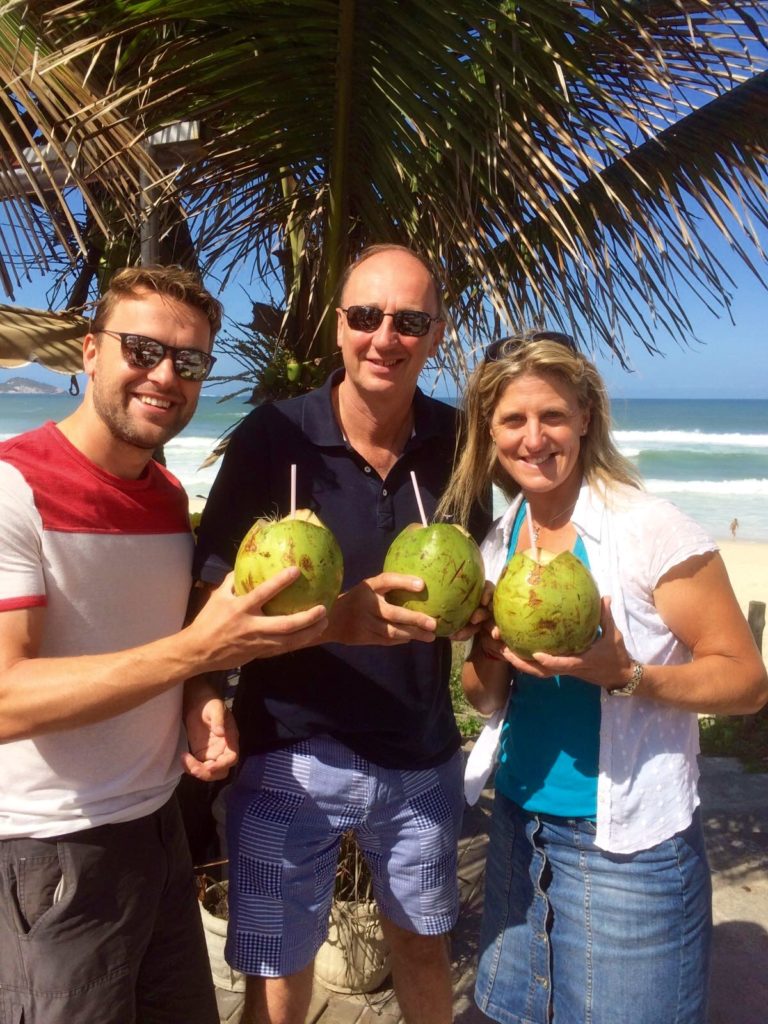 When I first joined up with Tina Cook who, after all, had been hoping to compete in the Games, we struck a deal. She would teach me about horses, and I would make her a broadcaster. Tina’s contributions soon became concise and informative, her timing spot on. Slowly, by sitting beside her, I got more of a grip on what makes horses tick and also the whole business of working out a showjumping course, with the short and long strides. I explained to her at the beginning that she should not be frustrated by the amount we commentate but to treat our contributions as a small piece in a very large jigsaw puzzle, which is constantly being updated. That is how BBC 5 Live runs its Olympics coverage, and it works brilliantly.
When I first joined up with Tina Cook who, after all, had been hoping to compete in the Games, we struck a deal. She would teach me about horses, and I would make her a broadcaster. Tina’s contributions soon became concise and informative, her timing spot on. Slowly, by sitting beside her, I got more of a grip on what makes horses tick and also the whole business of working out a showjumping course, with the short and long strides. I explained to her at the beginning that she should not be frustrated by the amount we commentate but to treat our contributions as a small piece in a very large jigsaw puzzle, which is constantly being updated. That is how BBC 5 Live runs its Olympics coverage, and it works brilliantly.
Meanwhile the BEF awarded me the Outstanding Equestrian Journalist of the Year and the Guardian very kindly awarded me a bronze medal for my dressage commentary. If you have followed this blog from beginning to end, you will understand what that means to me.
Golden Day
The day started early; I was up before dawn. But the individual dressage freestyle to music has been my focus since being set this assignment 18 months ago. It has been the butt of the jokes by my friends and colleagues who have never been slow to remind me that dressage radio commentary might be a challenge. I was as nervous as I can ever remember.
However, there was a feeling of tremendous anticipation as the BBC equestrian team set off on the early bus for Deodoro. Surely we would see Charlotte Dujardin win gold today? Mark Chapman presented Radio 5 Live from beside Tina and me in the commentary area, which made the whole business much more relaxing.
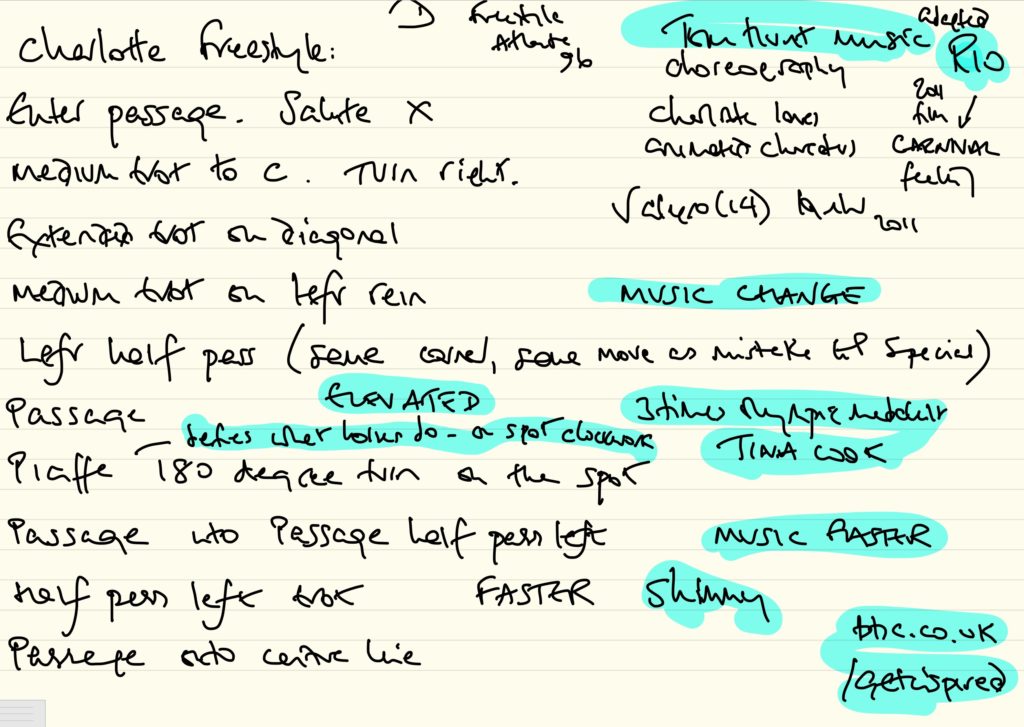 We knew we would be commentating uninterrupted on Charlotte’s performance, which is easier than being left to wonder. Preparation? OK. Here’s the first page of my notes. Charlotte and Valegro had only performed this once before, but thanks to Winnie Murphy at British Dressage, I had it on film and watched it over and over again.
We knew we would be commentating uninterrupted on Charlotte’s performance, which is easier than being left to wonder. Preparation? OK. Here’s the first page of my notes. Charlotte and Valegro had only performed this once before, but thanks to Winnie Murphy at British Dressage, I had it on film and watched it over and over again.
There was always the caveat that should she make a mistake, Charlotte could go off piste and do an element again, so it would have been foolish to stick rigidly to a script. When her score flashed up on the screen, it simply blew us all away. There were four riders to go, including two quality Germans, but no one was going to get 94%
The medal ceremony was fabulous and watching the Union flag hoisted to the National Anthem incredibly emotional. Charlotte gave me a lovely interview during which I teased her about the very public proposal of marriage her boyfriend, Dean, made during the medal ceremony. Turns out this was not the first time he has asked Charlotte to marry him, but this time he might get lucky. We left elated.
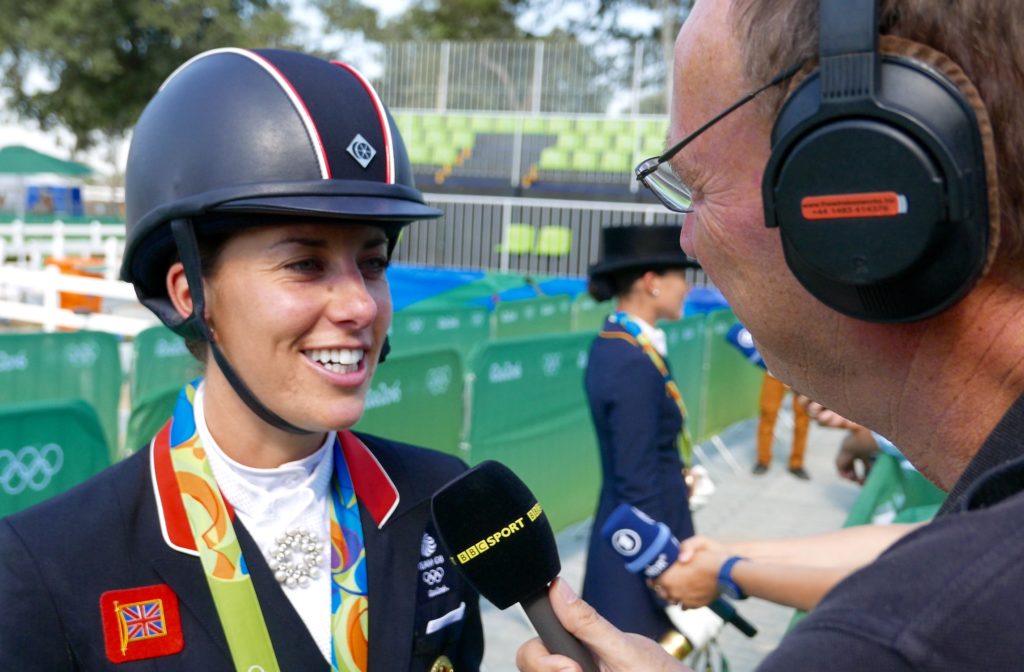 Inevitably there was some negativity on social media about dressage being a sport for ‘toffs’. People really should do a few seconds’ research before making sweeping generalisations. And I was asked many times to contrast the commentary with that when winning the Ashes. They are incomparable, really. An individual sport like dressage definitely draws your focus to that one person, especially genuinely nice ones like Charlotte. It is just brilliant to watch sporting success and be able to enjoy it unreservedly.
Inevitably there was some negativity on social media about dressage being a sport for ‘toffs’. People really should do a few seconds’ research before making sweeping generalisations. And I was asked many times to contrast the commentary with that when winning the Ashes. They are incomparable, really. An individual sport like dressage definitely draws your focus to that one person, especially genuinely nice ones like Charlotte. It is just brilliant to watch sporting success and be able to enjoy it unreservedly.
Magnificent Mo
Super Saturday gave us the first chance to get out and watch something different. Our colleagues from BBC TV are staying in our hotel, so athletics superstars like Paula Radcliffe, Michael Johnson, Jonathan Edwards and Steve Cram are regularly spotted over breakfast and we jumped on their bus to the stadium.
I’m ashamed to admit this was my first visit to live athletics. I deliberately sat next to Rob Nothman, whose encyclopedic sporting brain is rammed full of the facts and figures that ensure he is dispatched to report on the more obscure Olympic sports. Last count, he was approaching ten this time: a true all rounder. Within a few moments, he had calculated the precise distance by which Jessica Ennis needed to beat her Belgian rival in the 400m to win the women’s heptathlon and he urged me to keep an eye on the men’s long jump on the other side of the stadium, where Greg Rutherford was in action.
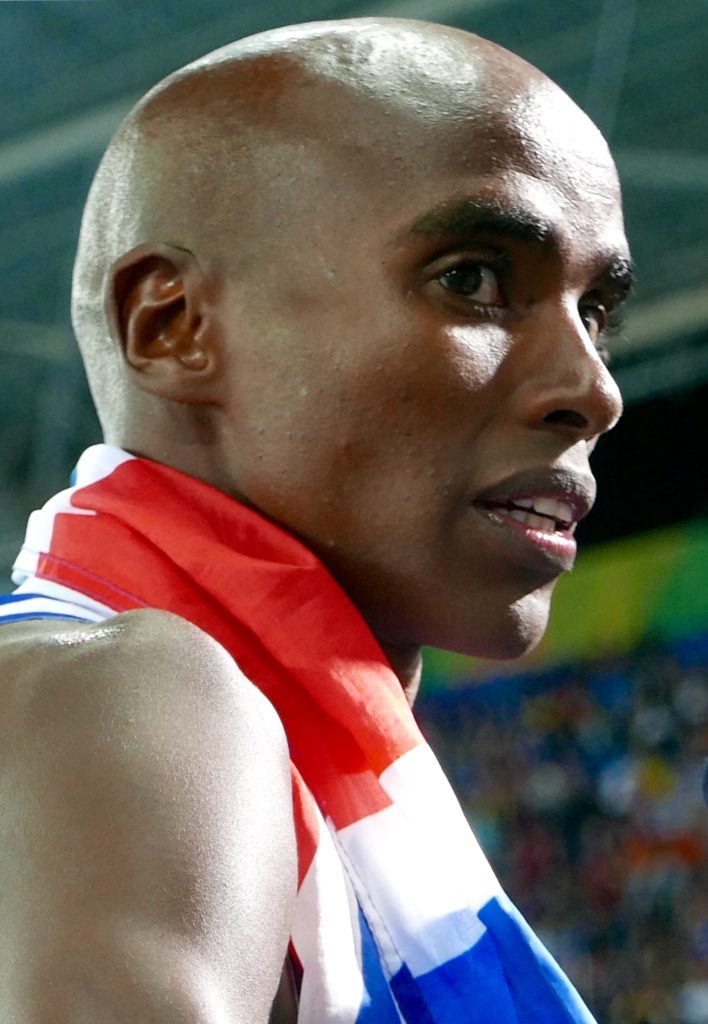 But the main business was Mo Farah’s 10,000 metres race. Being accredited journalists meant that we could sit in the off duty press area which just happened to be right on the finish line. Seriously! The crowd quickly gathered as the start approached and the reception for Mo was fantastic. Off they went, while the other events simply carried on undeterred. Unfortunately, we were barely aware of the Mo stumble. It flashed up only once on the giant screen and it was impossible to see from that single viewing what had happened, while TV viewers probably had the incident minutely dissected. However, we knew he had been down on his knees, which made his victory all the more remarkable. Usually sane colleagues of mine like my producer, Tim Peach, bellowed themselves hoarse as Mo came down the final straight. It was brilliant.
But the main business was Mo Farah’s 10,000 metres race. Being accredited journalists meant that we could sit in the off duty press area which just happened to be right on the finish line. Seriously! The crowd quickly gathered as the start approached and the reception for Mo was fantastic. Off they went, while the other events simply carried on undeterred. Unfortunately, we were barely aware of the Mo stumble. It flashed up only once on the giant screen and it was impossible to see from that single viewing what had happened, while TV viewers probably had the incident minutely dissected. However, we knew he had been down on his knees, which made his victory all the more remarkable. Usually sane colleagues of mine like my producer, Tim Peach, bellowed themselves hoarse as Mo came down the final straight. It was brilliant.
I’m always interested to see how other sports operate, and their handling of the electronic media, in particular. The Olympics set up what they call mixed zones, through which every competitor must pass on his or her way back to their changing rooms. They are not under any obligation to stop, but most do. I watched and took this photo as Mo made his way through the zone, patiently answering questions and giving interviews until he reached the last one, our own Sonja McLaughlan, who was sitting at desk number 49. 49! I was told later that Usain Bolt was in the mixed zone for one hour before he had finished. Then it was off to the press conference for the newspapers.
Back on the bus, I had to pay tribute to my athletics colleagues. This week has been pretty relentless for us in Deodoro, but nothing compared to the times and shifts these are doing. Back at 1am after the evening events, and then up at 6am for the early heats next morning. That is their schedule from now to the end of the Games. I know some people would have you believe this is all a jolly, but it certainly isn’t for them.
Synchronised Silvers for Test Match Special
Surely it can never have happened before: two Test Match Special commentators on air together, one describing dressage, the other trampolining, and both winning silver medals! Yes, it was a little surreal bouncing back to Ali Mitchell a couple of times while commentating on Charlotte Dujardin’s attempt to win the team gold in Deodoro, but it made for a lovely 15 minutes of radio and a brief connection with our day job.
 I had been building up to my stint all day. The first dressage test that Tina Cook and I had commentated on in full and, being the Grand Prix Special, a completely different test to the one we had been watching for two days and had successfully memorised. The build up to the medal positions was done in reverse order, which meant we did not feature on the radio much to start with, but it all came at a flurry towards the end as Germany, Great Britain and the USA competed head-to-head for the top spots.
I had been building up to my stint all day. The first dressage test that Tina Cook and I had commentated on in full and, being the Grand Prix Special, a completely different test to the one we had been watching for two days and had successfully memorised. The build up to the medal positions was done in reverse order, which meant we did not feature on the radio much to start with, but it all came at a flurry towards the end as Germany, Great Britain and the USA competed head-to-head for the top spots.
To be honest, Germany had more than just one hand on the gold medal when Charlotte and Valegro cantered into the arena. Three percentage points are a lot to overhaul in this situation, but with those two, you simply never know. However, going into only the third movement, a left half pass, disaster struck. I was actually commentating while looking away at the scoring screen when Tina gasped. I looked up and clearly Valegro had misunderstood the instruction and broken into canter. The whole thing seemed to be in slow motion while Charlotte tried to rectify the situation, but it was too late. There would be no coming back from that, but at least silver was now all but guaranteed, and that was the realistic ambition at the start of the Olympics. I likened it to playing cricket against a team that had bigger bats. The German horses would take a lot of beating.
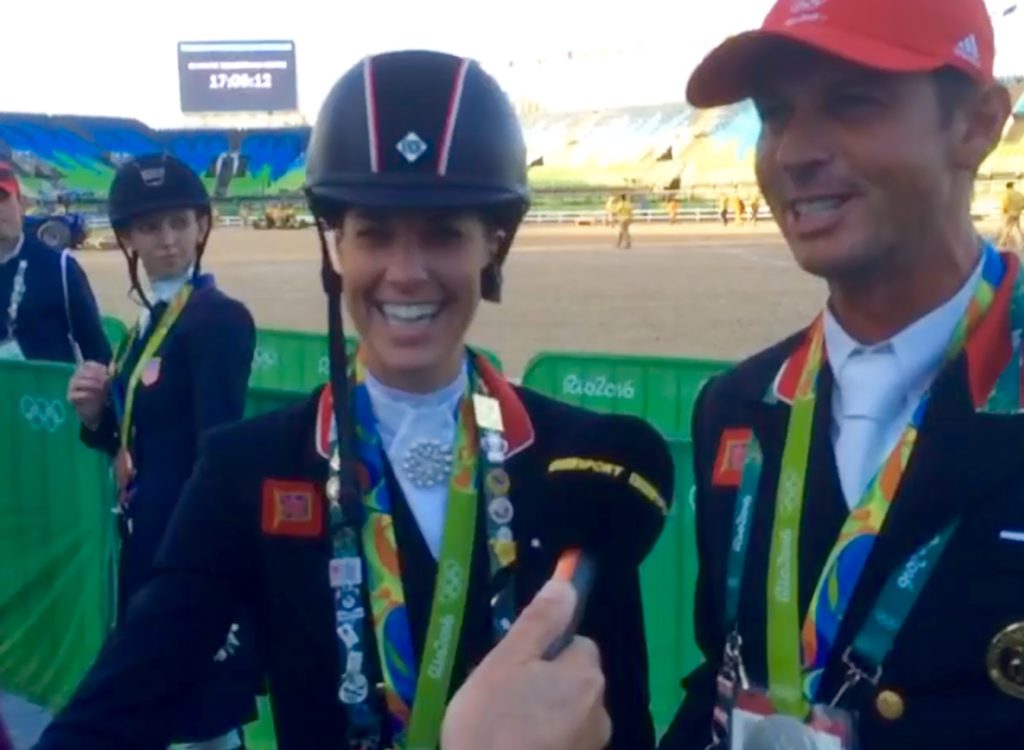 As I waited to interview the team after the medal ceremony I reflected on what an extraordinary thing sport is. Only the day before, Charlotte and Valegro had produced a true champions’ performance. Today, we saw an error that will have reminded every amateur rider that no matter how brilliant this pair is, at the end of the day it is all about communication between a human and a horse: the subtlest of movements and indicators that tell the horse what you want it to do. Whatever your level, sometimes it just does not happen. It made no difference to the outcome, and I rather hoped that those watching or listening to us, but who were not really interested in dressage, might have appreciated just a little more what this sport is all about.
As I waited to interview the team after the medal ceremony I reflected on what an extraordinary thing sport is. Only the day before, Charlotte and Valegro had produced a true champions’ performance. Today, we saw an error that will have reminded every amateur rider that no matter how brilliant this pair is, at the end of the day it is all about communication between a human and a horse: the subtlest of movements and indicators that tell the horse what you want it to do. Whatever your level, sometimes it just does not happen. It made no difference to the outcome, and I rather hoped that those watching or listening to us, but who were not really interested in dressage, might have appreciated just a little more what this sport is all about.
And also of the risks involved. While the attention will focus on Dujardin and Hester, this was a special moment for Fiona Bigwood. A dreadful accident two years ago left her with the real prospect of never being able to ride again. Only through wearing an eye patch to balance her damaged sight, was she able to pursue her dream. Today she is an Olympic medalist.
The incident in the stables
I have been present at a number of bizarre press conferences over the years, such as that during the Mike Atherton ‘dirt-in-the-pocket’ business which none of us knew was being broadcast live on BBC 1. The one at Carrara in 1991 after David Gower and John Morris hired two Tiger Moths and buzzed the ground was a beauty. None of the management was aware, of course, including the manager Peter Lush who publicly combusted when told of it by the smirking media. Serious ones, too, such as being withdrawn from India after the Mumbai attacks in 2008.
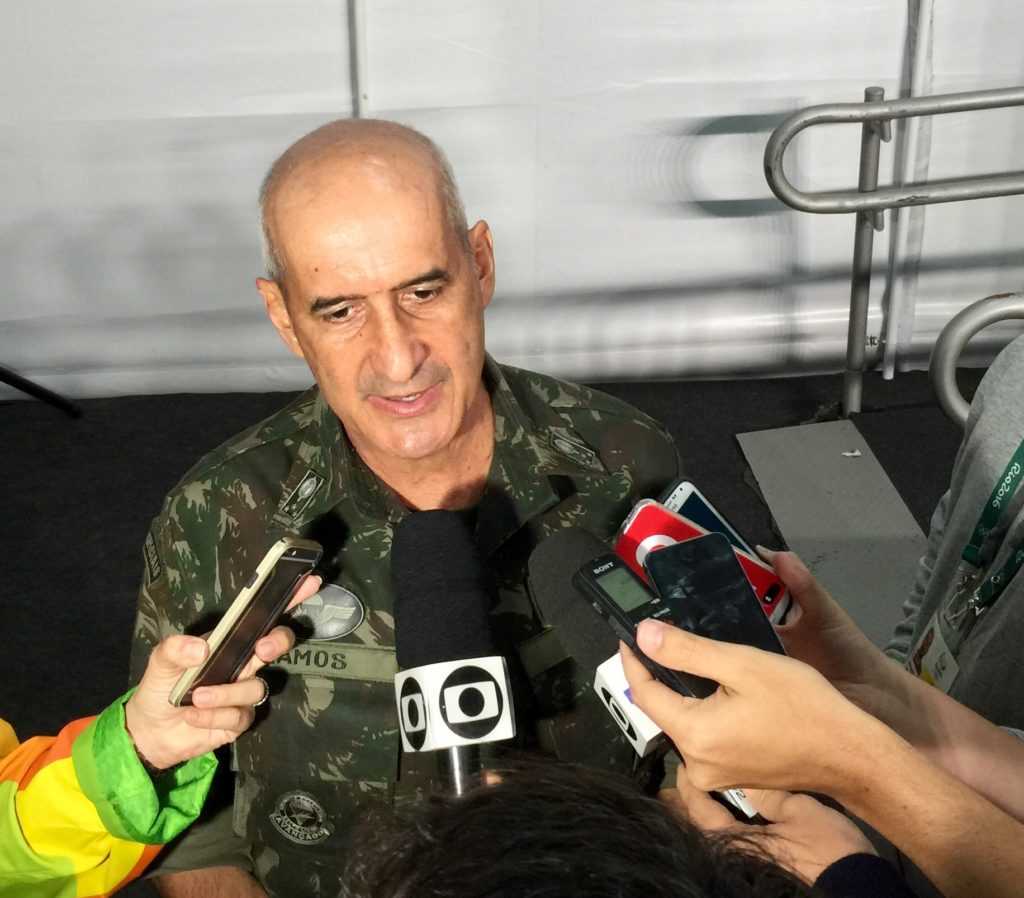 This evening, we were provided with another classic to add to that celebrated company. Rumours had been circulating all day of an incident in the stables, housing the prized Olympic horses. A bullet had been discovered, hot on the heels of the round that pierced the wall of the media centre, narrowly missing the New Zealand press attaché. So General Luiz Eduardo Ramos, the commander of 5,500 troops in the Deodoro area, was summoned to offer an explanation.
This evening, we were provided with another classic to add to that celebrated company. Rumours had been circulating all day of an incident in the stables, housing the prized Olympic horses. A bullet had been discovered, hot on the heels of the round that pierced the wall of the media centre, narrowly missing the New Zealand press attaché. So General Luiz Eduardo Ramos, the commander of 5,500 troops in the Deodoro area, was summoned to offer an explanation.
After an extensive introduction in which the General briefed us on his life story, it was down to the nitty gritty. Except there wasn’t any. Despite an earlier statement confirming rumours that a bullet had been found in the stables, the General insisted this was not the case. It had been discovered some distance away. ‘What about Saturday’s bullet’, I enquired. ‘Are we safe?
‘There is no risk’, he replied. ‘It was not direct shooting.’
‘Well it must have been fairly direct’, I responded, pointing to my left. ‘It came through that wall.’
‘No, insisted the General. ‘It came from the sky like a little stone. There is no risk. You receive some direct shooting but no one here is in danger.’
A question came in from a German reporter, asking about the regular rattles of machine gun fire that journalists staying locally hear during the night. The General confirmed that from now on, the army would desist from all armed training.
‘If you hear gunfire from tomorrow’, he added. ‘Something is wrong’.
How reassuring.
Confetti in the wind
Commentating on cricket is a straightforward business. You look out of the window and describe what you can see. Obviously there is time to fill between deliveries and overs, but there is no shortage of things to say if you use your eyes and a bit of imagination. As I discovered, commentating on equestrian cross country is rather different. The course is laid out over 3 and a half miles and 33 jumps, which the horses must cover in 10 mins and 15 seconds. That is an average speed of 20 miles per hour, and I hope explains why commentary is done off a TV, rather than running alongside each horse, as one of my kind correspondents seemed to suggest I should be doing.
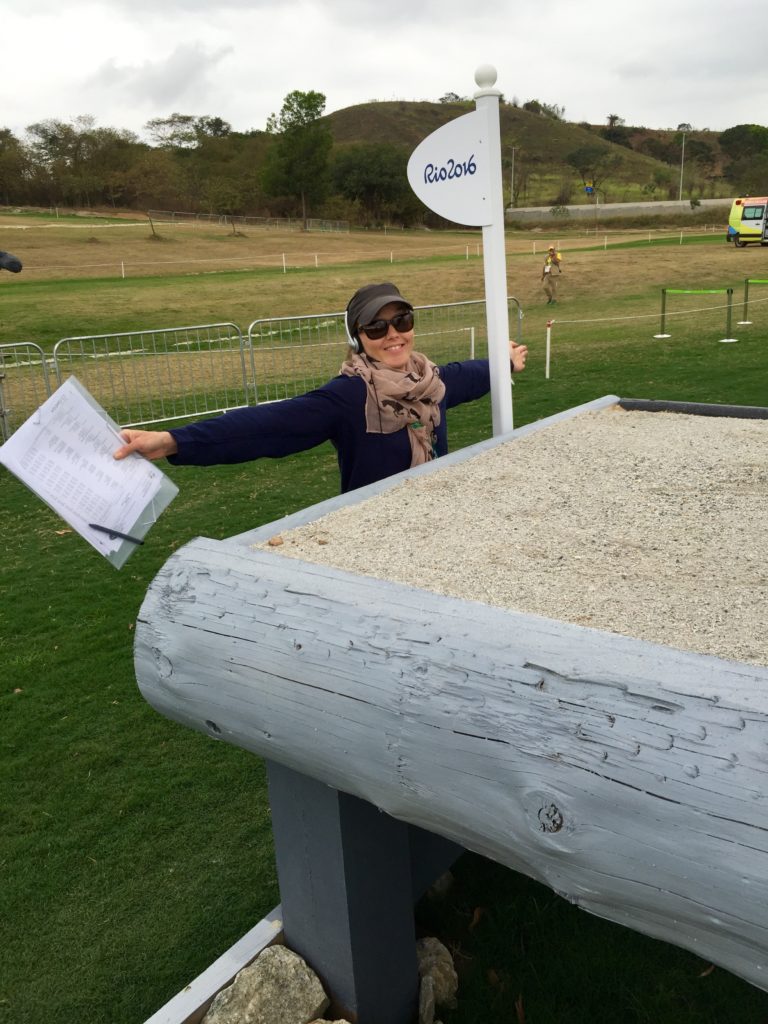 I have never commentated from a television feed before. I reckon even doing a good job on cricket would be difficult because the view is so tight and restricted. You also have no idea what the director is going to do or what pictures you are going to get. After grabbing a few minutes on the course with Victoria Pendleton, Tina Cook and I settled into our seats. They are the same as for the dressage and the showjumping, and the view of the arena is perfect. The view of the cross country is non-existent.
I have never commentated from a television feed before. I reckon even doing a good job on cricket would be difficult because the view is so tight and restricted. You also have no idea what the director is going to do or what pictures you are going to get. After grabbing a few minutes on the course with Victoria Pendleton, Tina Cook and I settled into our seats. They are the same as for the dressage and the showjumping, and the view of the arena is perfect. The view of the cross country is non-existent.
Almost immediately the scale of the challenge became apparent. Two, sometimes three horses were on the course at the same time. Only rarely did a graphic appear to illustrate which was on screen at that particular time, and only occasionally did the name of the next fence appear. Who is it? And where are they?
I likened it to trying to catch confetti in a strong wind. Clinging desperately to snippets of information and years of experience. ‘Here comes Kitty King at the start of her cross country….’ and the picture cuts straight to a Russian somewhere on the course. Thank goodness for Tina Cook who was able to chat away with me while we waited for the British rider to appear on the TV once more. It was the most difficult, and yet definitely one of the most rewarding days of broadcasting.
Not as rewarding for the British team, however. At least they all got round the course, which was challenging, but not overly so, in my view. There were a couple of spills, inevitably, but the Zimbabwean and Chinese riders finished comfortably enough in their first ever Olympic appearances. British hopes of an eventing medal are bleak with just the showjumping to come.
Under fire. Literally
The first day of the Olympic Games. Deodoro was baking hot and offering no protection to the spectators sitting out in the 35 degrees heat. There was also a distinct lack of cover in the media centre where during the lunch break, a bullet made an unscheduled appearance. Depending on which report you believe, the bullet either ‘tore through the media centre’ or ‘plopped through the roof and onto the floor beside us’. That second version was provided by the man sitting next to me, Ian Stark, who was enjoying a break from commentating on BBC TV.
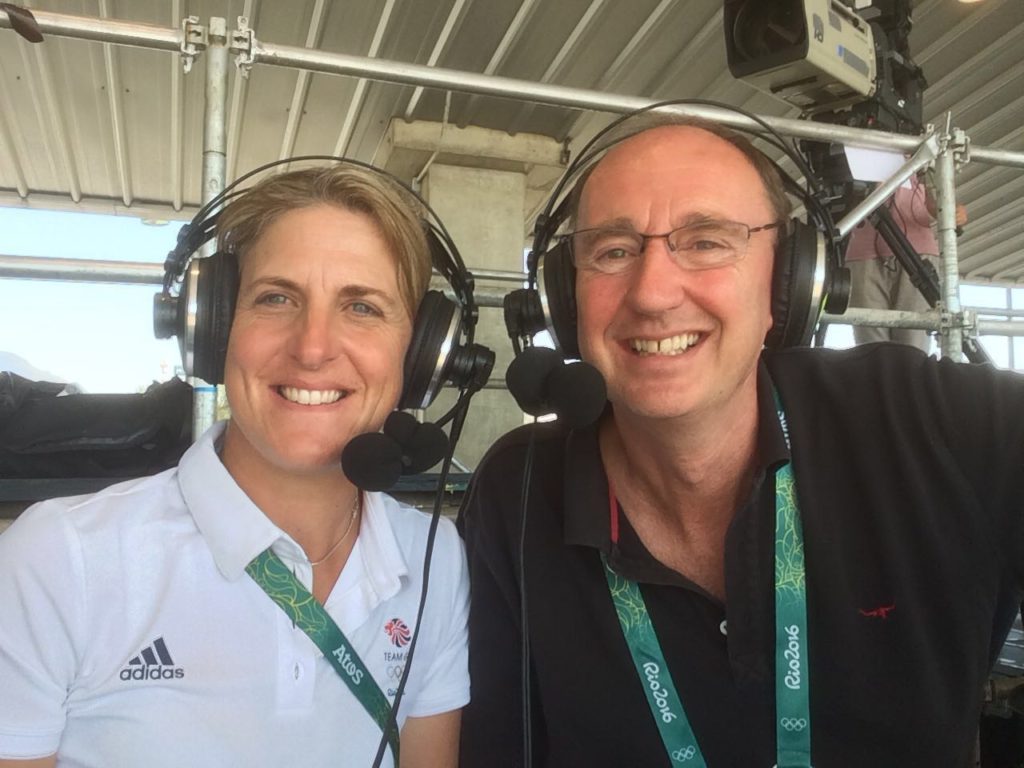 Either way, it was a rather worrying development, but it does not appear to be anything connected with terrorism. More likely this was a stray round from the army firing range. I preferred the possibility of it being a shot, loosed off celebratory style by Ginny Thrasher who won the first gold of the games in the 10 metre air rifle competition about one mile from here.
Either way, it was a rather worrying development, but it does not appear to be anything connected with terrorism. More likely this was a stray round from the army firing range. I preferred the possibility of it being a shot, loosed off celebratory style by Ginny Thrasher who won the first gold of the games in the 10 metre air rifle competition about one mile from here.
I had also come under fire earlier in the day when a bizarre protest by the Daily Mail’s Peter Oborne rather took the gloss off my first morning. In a strange rant, Oborne complained about the BBC sending me to Rio rather covering the Test at Edgbaston. He based this on his flattering description of me as the lynchpin of the programme. Surely this is not the same Peter Oborne who, in 2001, wrote in the Spectator that TMS did not have a future while I remained in the team?
All of that, though, is trivial compared to the performance by William Fox-Pitt who led the dressage after the first day with 37 penalties, ahead of the Olympic champion Michael Jung. William must get through his greatest challenge, which will be the Cross Country, but what an amazing start to his come back this is. Tina Cook and I commentated on his test, which began in the worst possible way when a half drunk cup of coffee blew over and onto my notes just as we started. My first effort was OK, nothing more, and valuable experience. And yes, Mr Oborne, I really recommend a change every now and then. A fresh challenge works wonders. You should try it.
An appointment with the Redeemer
Well, it had to be done. Although the streets were teeming with traffic thanks to an anti-games demonstration, this was the only chance for many of us to visit one of Rio’s great landmarks. Because the journey took so long, it was just about dark when we finally made it up the winding road and ran up the broken escalators to savour the magnificent view not only of Cristo Redentor, but also the stunning views of early evening Rio.
Yes, it is a tourist trap and, yes, the statue will feature far too often on the TV coverage: I know all of that. But clearly it is a ‘must do’ and, frankly, the views are amazing. It is a shame it was a bit dark, but you really got a sense of Rio coming to life with the lights twinkling in the distance, and I’ll just have to go another time in the future for a daylight experience.
You couldn’t move for selfie sticks and, surely a first, there are specially laid mats so visitors can lie flat on their backs and take a vertical photo of the statue. Seriously. I also overheard Steve Cram muttering something about the Angel of the North. Apparently he had persuaded his partner, Alison Curbishley, that their local landmark is bigger than this!
Workwise, it was very busy in the BBC section of the IBC with the opening ceremony kicking things off this evening. I waved the two Tims off to their shed as I was to pop up during tea on Test Match Special, and I could keep an eye on the horse inspection without having to go to Deodoro. We were pretty confident that all the GB horses would pass their fitness tests, and so it proved.
There was a bit of a panic on when I arrived at IBC for my TMS hit because Pakistan were 9 wickets down, tea could be taken at any moment and I did not have a guest to talk to. We were rescued by Sir Matthew Pinsent, no less, but far from transporting our listeners to Copacabana or to our old friend, the Redeemer, the only place we could get a signal was in the generator compound beside the bus park of the media centre. Sometimes, that is how radio has to be and 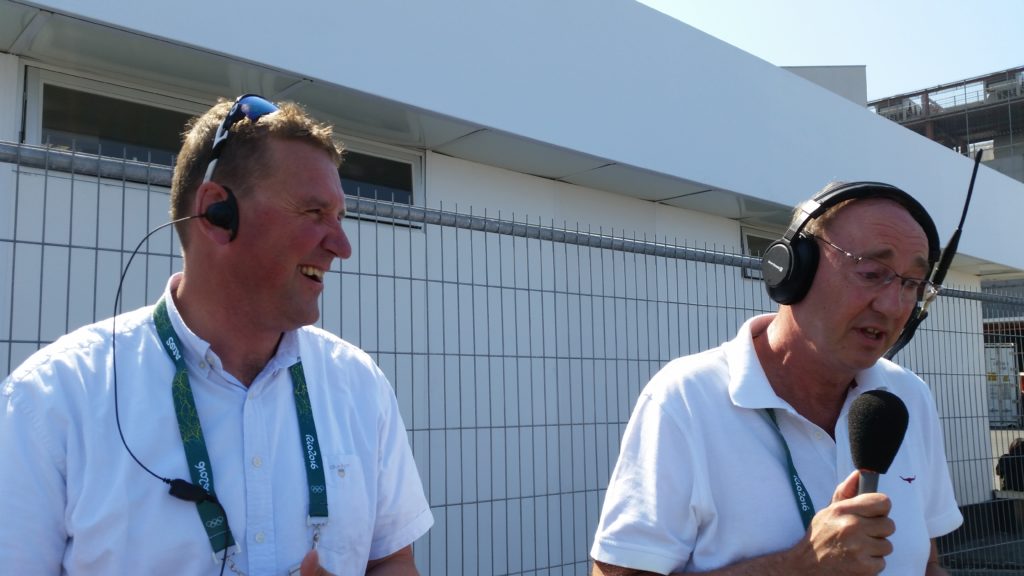 Matthew gave a brilliant buildup to the Olympics.
Matthew gave a brilliant buildup to the Olympics.
So, tomorrow it all starts. Eighteen months after that phone call we are now at zero hour. It should be a good opener, too, with the defending champion Michael Jung, William Fox-Pitt and Sir Mark Todd all in action. And I will finally be united with my sidekick for the fortnight, Tina Cook – as long as we can sort out her accreditation in time.
A most productive day
By now we are well acquainted with the road from Barra to Deodoro. Past the athletes’ village with flags draped from the windows (I still haven’t seen ours yet and there are many I don’t recognise) past Olympic Park, where the main arenas are situated, and out past a favella – or over the top of a favella, if I’m honest – to Deodoro, which is basically an army base.
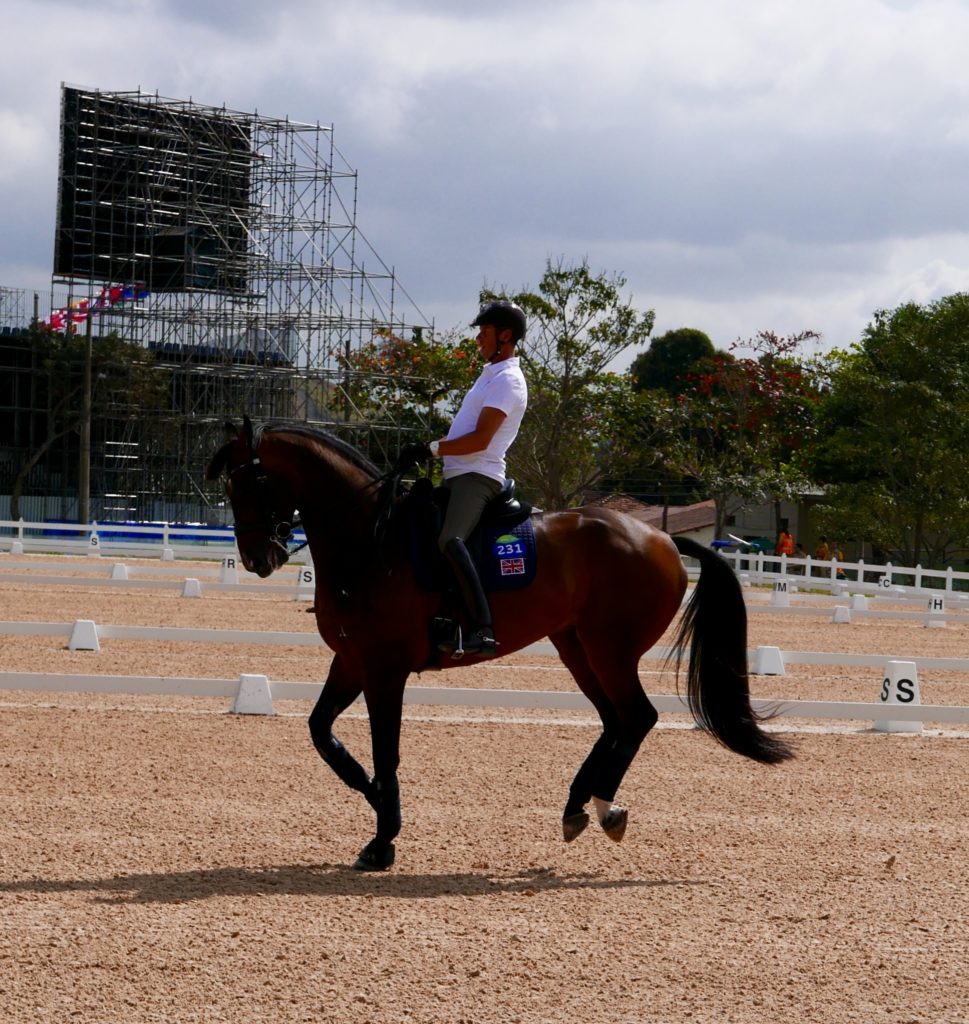 The two Tims (producer and engineer) still have not got any broadcasting circuits between any of the many commentary positions and the shed, so I left them to argue with various technicians and wandered over to the warm-up arenas in the hope of spotting a recognisable face or horse. Immediately I bumped into Ian Woodhead, the dressage coach who teaches Emma and who has helped me so much, and is now with the Irish team. Then onto the first arena where Kitty King was putting Ceylor LAN (or Sprout) through his paces. Last time I saw him he was being hoisted into the back of a 777 at Stansted. William Fox-Pitt wandered over for a natter. It always surprises me how someone so tall can ride a horse. He is the only man in an otherwise all female team, so I offered him some male company if he fancied a change.
The two Tims (producer and engineer) still have not got any broadcasting circuits between any of the many commentary positions and the shed, so I left them to argue with various technicians and wandered over to the warm-up arenas in the hope of spotting a recognisable face or horse. Immediately I bumped into Ian Woodhead, the dressage coach who teaches Emma and who has helped me so much, and is now with the Irish team. Then onto the first arena where Kitty King was putting Ceylor LAN (or Sprout) through his paces. Last time I saw him he was being hoisted into the back of a 777 at Stansted. William Fox-Pitt wandered over for a natter. It always surprises me how someone so tall can ride a horse. He is the only man in an otherwise all female team, so I offered him some male company if he fancied a change.
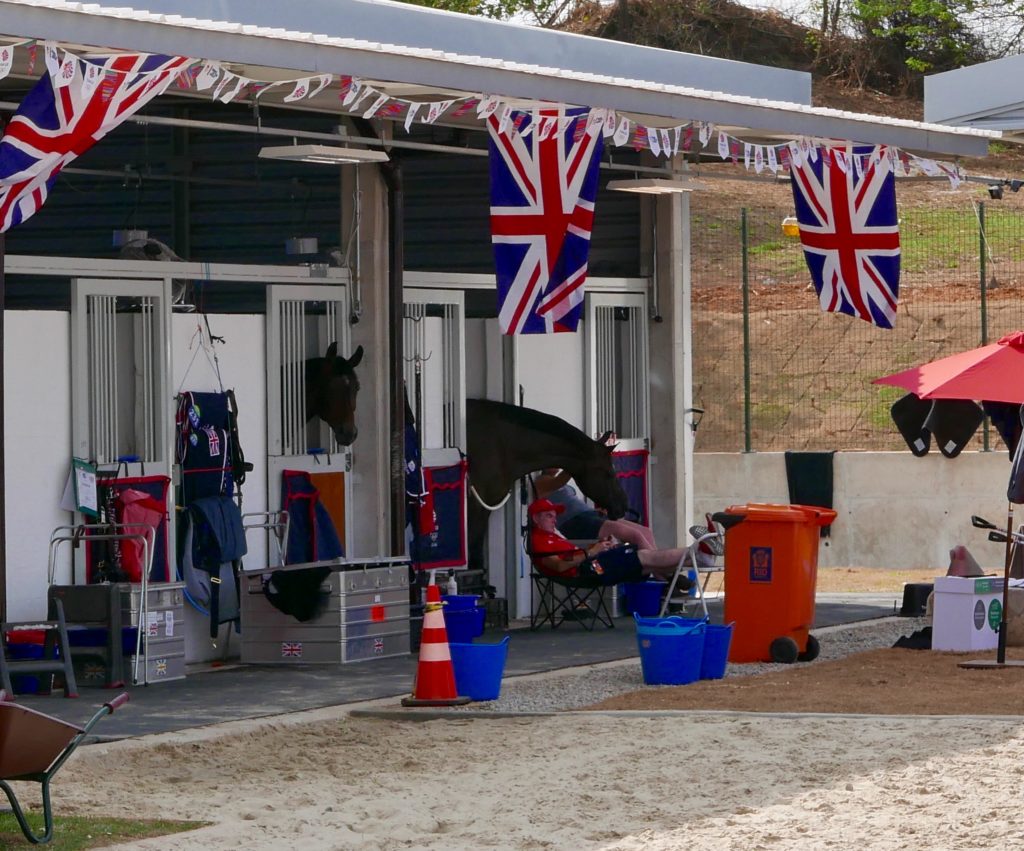 “Morning Jonathan!” and the irrepressible Carl Hester rode past. What a warm, friendly character he is. And settled under a tree, I watched one of the best in the world go through his paces. It all seems so effortless, like watching Gower bat, or Henri play football. Charlotte Dujardin, having already practised, watched quietly from the sidelines and told me they are giving Valegro a gentle build up to the event. We will not see the dressage team in action until well into next week.
“Morning Jonathan!” and the irrepressible Carl Hester rode past. What a warm, friendly character he is. And settled under a tree, I watched one of the best in the world go through his paces. It all seems so effortless, like watching Gower bat, or Henri play football. Charlotte Dujardin, having already practised, watched quietly from the sidelines and told me they are giving Valegro a gentle build up to the event. We will not see the dressage team in action until well into next week.
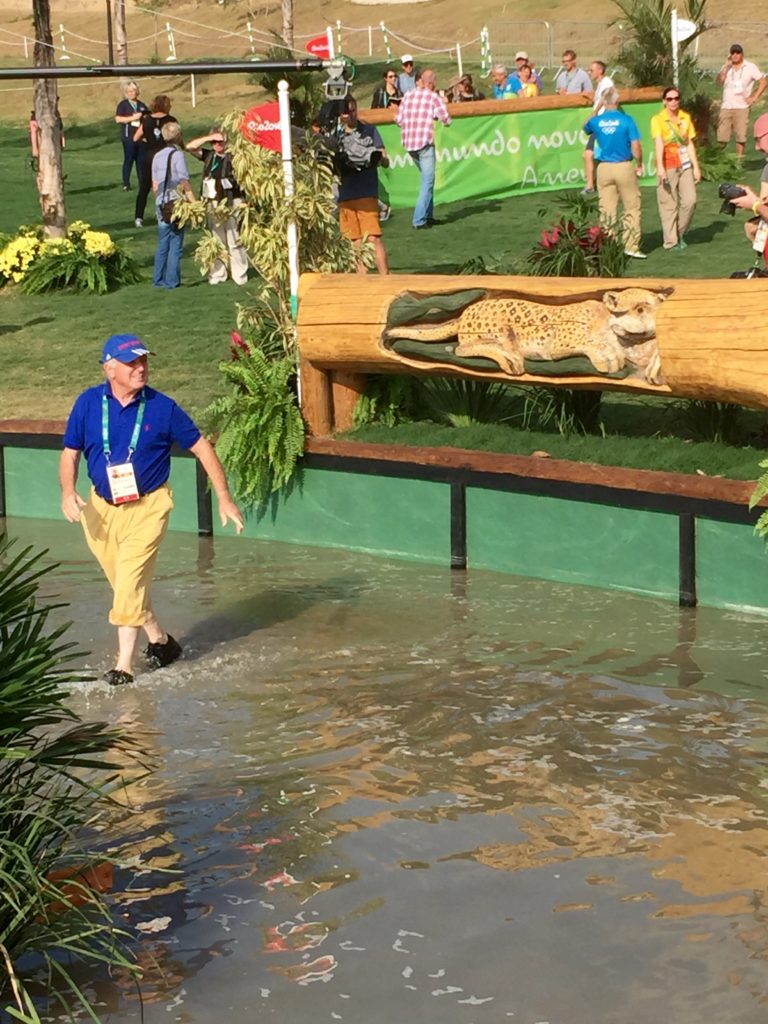 And so to the main, pre-planned event of the day which was to walk the cross country course. This is always one of the most anticipated parts of the build up to a 3 day event and this included a brief tour of the stables, which as we were constantly reminded, is a quarantine area and we must not touch anything on our way through. This time, the Union Flag was instantly in sight: it is comfortably the biggest flag on the site, dwarfing the Americans next door. Valegro was poking his nose out of his stable, apparently checking the spelling of a text written by Alan, his devoted groom, who was reclining in a chair outside.
And so to the main, pre-planned event of the day which was to walk the cross country course. This is always one of the most anticipated parts of the build up to a 3 day event and this included a brief tour of the stables, which as we were constantly reminded, is a quarantine area and we must not touch anything on our way through. This time, the Union Flag was instantly in sight: it is comfortably the biggest flag on the site, dwarfing the Americans next door. Valegro was poking his nose out of his stable, apparently checking the spelling of a text written by Alan, his devoted groom, who was reclining in a chair outside.
There was a thought that perhaps the London 2012 course had been rather safe. Olympic courses are aimed at 3* rather than the 4* standard of Burghley or Badminton to enable more entrants, and soon BBC’s Mike Tucker and Ian Stark were quietly purring at the lay-out of this one. Plenty of easier options are on offer, but these will result in serious time issues, while the fences themselves are based on local themes and almost all massively solid wood. The carvings in the trunks are beautiful: macaws, toucans, jaguars and anacondas. But most important is the overall difficulty level being higher than expected.
I managed most of the course, rushed on air in Tim’s shed and proudly announced I had walked 14000 steps. The two Tim’s had both recorded 28000.
Arrival in Rio: Finding my feet
Just back from looking around my new home at the Deodoro Equestrian Centre. This is where I shall be stationed for the next fortnight, with the action starting properly on Saturday. It is a vast place, and while some newspapers will inevitably be running negative reports about the readiness of the venue, as a veteran of many cricket tours where things suddenly happen at the very last minute, I reckon everything is looking good.

One of the first tasks was to settle our producer, Tim Peach, into the shed from where he will control our coverage of equestrianism, hockey, canoe slalom, rugby 7’s, shooting, BMX and modern pentathlon. We will try and let him out a couple of times per day for a whiff of fresh air, but all in all he looked well pleased with his nerve centre.
Under the expert tutelage of Clare Balding and Lee McKenzie, Eleanor Oldroyd and I walked a small section of the cross country course. The riders do not get a glimpse until Friday, and Clare seemed very encouraged by the challenging nature of the jumps we encountered, especially the crafty ‘skinnies’ which, as their name suggests, are very narrow and any slight misjudgment might result in the horse ‘running-out’. Tomorrow we will walk the whole thing, and there is also a tour of the stables, which will be interesting.
The sheer scale of this event is remarkable. I ventured into the IBC (International Broadcasting Centre) to file a report this evening, spotting the Daily Mail’s Charlie Sale lurking en route. It is worth stopping and listening for a few moments to the cacophony of languages that are being spoken into cameras and microphones. I think at the last count there are 2000 accredited members of the media, all of whom seem to queue for lunch at exactly the same time. The BBC HQ is 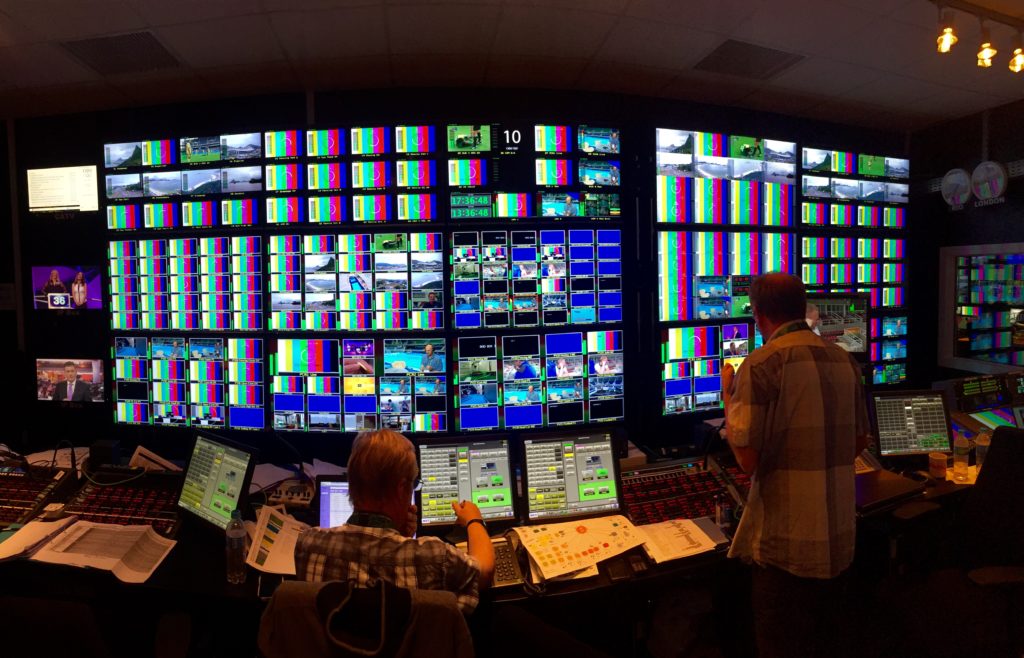 right in the middle, and home to engineers, journalists, producers, directors and the biggest bank of TV screens in a gallery I’ve ever seen!
right in the middle, and home to engineers, journalists, producers, directors and the biggest bank of TV screens in a gallery I’ve ever seen!
So far I have not seen much of Rio: not a glimpse of Christ the Redeemer or of Sugarloaf Mountain. The weather is warm, quite unsettled and the days are short – it is dark by 5.30pm. The Olympic lanes are a Godsend for navigating quickly through the teeming traffic and, touch wood, I have not yet seen any sign of a mozzie. It was strange waking up at 0630 to listen to Test Match Special and the first home Test I have ever missed, but the team did a great job. Did I miss Edgbaston? A little, of course. But a few moments listening to the myriad languages in the IBC is a reminder of what a huge global event this is about to become.
Loading the horses, July 29th
This was really special: a 9 o’clock appointment on a remote location at Stansted Airport to film for the first time horses embarking on their long flight to the Olympics. In all there were 34 horses, representing countries from all over the world including China and for the first time, Zimbabwe. Those from TeamGB were there too, and I had promised Kitty King plenty of photos of her beloved Sprout (or Ceylon LAN to call him by his posh name) as he was loaded up. Kitty and her eventing team mates were flying out of Heathrow on the same day. Only a couple of vets and grooms accompany the horses.
This made for some emotional farewells. Camilla Kruger, from Zimbabwe, was very moved as Sam the Man was led away for boarding. I watched every horse go through the same procedure, and they all settled happily in pairs into their mobile stables, which would be their home for the next 12 hours.
Look at this chap take one last lingering look at Blighty before finally being coaxed into his temporary accommodation!
The inside of the Boeing 777 was nothing like we are used to. Apart from half a dozen seats at the front, the rest was stripped to the skin, with a series of tracking all over the floor. This is where the precious cargo was latched down and, still calmly nibbling on their hay nets, the passengers seemed entirely unconcerned about their journey to Brazil. After all, they are used to travelling all the time, so whether it is a horse box or an aircraft, it really makes no difference. However, this is a 12 hour flight and, just like us, horses do suffer from ears popping. To help prevent this, they are constantly fed with hay and every two hours, it is placed on the door so they lower their heads and clear the build up of pressure.
 I spoke to the captain of the flight, who told me that he takes much more care when taxiing round corners when he has horses on board than humans! They travel facing forwards, so take off and landing is fine, but sudden sideways movement must be avoided. A tweet from the Team GB vet in the middle of the night confirmed their safe arrival, so riders and horses will now be reunited. This time next week, they will be competing.
I spoke to the captain of the flight, who told me that he takes much more care when taxiing round corners when he has horses on board than humans! They travel facing forwards, so take off and landing is fine, but sudden sideways movement must be avoided. A tweet from the Team GB vet in the middle of the night confirmed their safe arrival, so riders and horses will now be reunited. This time next week, they will be competing.
Olympics selection day, July 5th
Time for a serious reality check: in less than one month, I will be in Rio. The venue for the announcement was Kitty King’s Wiltshire base – and very lovely it is too. Having checked the address the day before and discovered this snippet of info, I felt confident enough to send Kitty a congratulatory text and she responded with a smiley face, so I knew all was well. But what of the others, and William Fox-Pitt in particular?
Mrs King Snr was in charge of providing the gathering media with teas and coffees while we waited and finally the unveiling began. There was William, tall and relaxed, and clearly very relieved to have made the cut only 9 months after his dreadful accident. He spoke very movingly about that, the coma of which he clearly remembers absolutely nothing and the fight to restore his eyesight. Confidence, too. This is one brave man.
It was a good turn out, with only Charlotte Dujardin and Carl Hester missing because of Hartpury duty the following day, and it was a great chance to meet the athletes who I have not yet bumped into. I think I have now met the whole team, which is great.
Back to the day job
It has been a brilliant few weeks in which I have learned a lot, but there’s still lots to do. For example, I have yet to attempt any dressage commentary, and I will have to do so at the Olympics while watching Charlotte Dujardin and Carl Hester. I will be going to the show jumping at Bolesworth and meet the performance director, Di Lampard there. I have also put in a request for Scott Brash, but let’s see.
Valegro has his first pre-Olympics run out at Hartpury in July, so that will definitely be on the agenda. It will be very interesting to see how Carl and Charlotte treat him in the build-up. On the one hand he needs to be sharp and fit, but there’s also the unmentionable possibility of his picking up an injury.
We have now had our first BBC Olympic briefing in Salford. The sheer scale of the coverage is amazing. I am used to touring and outside broadcasts, but with TV, radio and online all combining in this massive operation, it really is remarkable. Whoever organised all of this deserves a medal. Zika was mentioned, of course, and Ali Mitchell revealed she has bought her own mosquito net. Seems sensible to me, but I would love to watch her try and put it up!
And so definitely invigorated by my new challenge, it is back to cricket. England play Sri Lanka first, followed by Pakistan whose first Test at Lord’s will be my 300th. It will be good to get back to a sport I know something about!
Filming for Horse and Country TV
Here’s a trailer for a lovely interview on horseback – definitely the first I have ever done! Rudall rides with Aggers can be found at Horse and Country TV, online and on Sky 253
Badminton
This was my first visit to Badminton, and I was astonished by the huge crowds that turned out in the beautiful sunshine. So much so that having made the return trip to the Vale by car on Friday (3 1/2 hours each way) I flew myself down on Saturday and back on Sunday (50 mins each way) and looked down very smugly on the miles of queuing traffic. It is a lovely grass strip only a 10 minute walk from the arena. Perfect; even if the final approach through the hedge is interesting!
This was the big one in that it was to be my first equestrian commentary, my producer, Tim Peach, having secured a two-hour slot on Sunday afternoon for the showjumping. A lack of confidence made me a bit tetchy (if I’m honest all presenters have these crises from time to time) and this wasn’t helped by the first inspection of the commentary box: a large and echoing portacabin with a wonderful view of the warm-up area, but with its back to the arena. Thankfully Tim, experienced in these matters, lashed up some extra leads and found us a spot at the back of the North Stand from where we could, at least, see the action.
Again, everyone we met was incredibly kind. I had lunch on the Friday sitting next to Kitty King, GB’s 4th ranked eventer and Olympic hopeful, who was resting her horses this week. Within 5 minutes of banter I knew she would be perfect to help me on the radio and signed her up. I told Tim: “Oh! I’ve just signed up William Fox-Pitt!” We decided to have both. And Clare Balding at the start of the programme to welcome me to her sport.
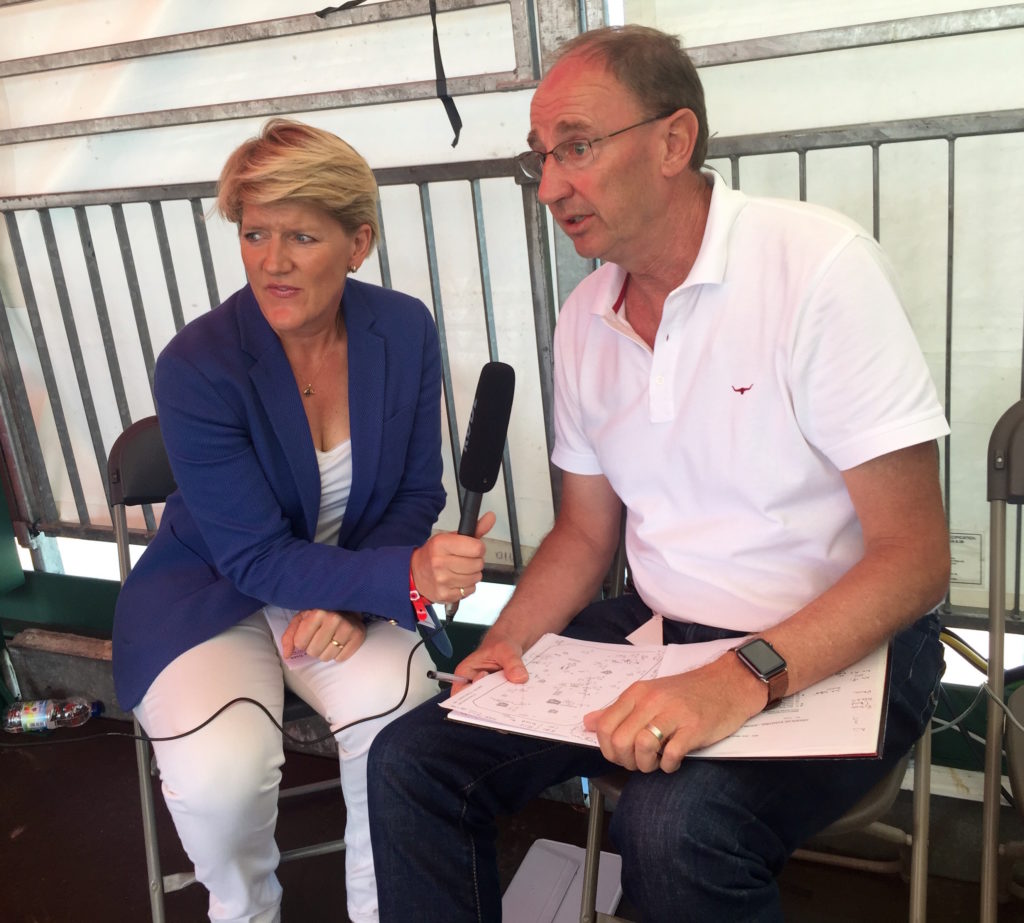 Yes, I was nervous, but believed I could cope. I have commentated on several Royal events and also a little on archery, so drying up should not be a problem. Yogi Breisner, the charming GB eventing performance director set it all up with excellent background and Olympic build-up before the first competitor trotted into the arena and the surprisingly tall Fox-Pitt sat down beside me, clutching a microphone and shook hands. We had met once, briefly, last year.
Yes, I was nervous, but believed I could cope. I have commentated on several Royal events and also a little on archery, so drying up should not be a problem. Yogi Breisner, the charming GB eventing performance director set it all up with excellent background and Olympic build-up before the first competitor trotted into the arena and the surprisingly tall Fox-Pitt sat down beside me, clutching a microphone and shook hands. We had met once, briefly, last year.
William was outstanding. He had never worked on the radio like this before, but added real insight and gravitas to the broadcast. He gave a chilling account of his accident, from which he is slowly making a full recovery and we can only hope that he is able to qualify for the Olympics. There is a parallel to be drawn with James Taylor, who was forced to retire from cricket last month and quite possibly saved his life through doing so. William has a very grounded view of life following his dreadful fall, but is also determined to carry on competing. After half an hour, Kitty moved in and, again, did a great job in giving just the right depth of background and knowledge to accompany my fledgling commentary. We watched as Michael Jung completed his magnificent, but predictable victory and when the programme ended it was with a mixture of relief and also pleasure in that it had gone OK.
So what did I learn? First, that you get given a map of the course. I worried that I’d have to sketch something out beforehand (told you I’m coming from a low starting point) Second, that the flow of the competition makes a nice gentle pace for continuous commentary. No sooner has one competitor finished, the next is in the ring. Third, I have to find more ways to describe a horse jumping over a fence. 20 horses x 13 fences = 260. That’s a lot of: “over they go’s”. Fourth, I need better description of each fence. What do they look like? Are they singles, or double or triple combinations? Oxers? How high? What makes some difficult and some easier? Fifth, more description of the course. This one gently snaked around but I could give a better picture of its twists and turns. Sixth, unlike TMS, I have to provide the stats. More work needed on recent form of the competitors.
There we go! First commentary under my belt, much learnt, new contacts made and another airfield to tick off. A perfect weekend.
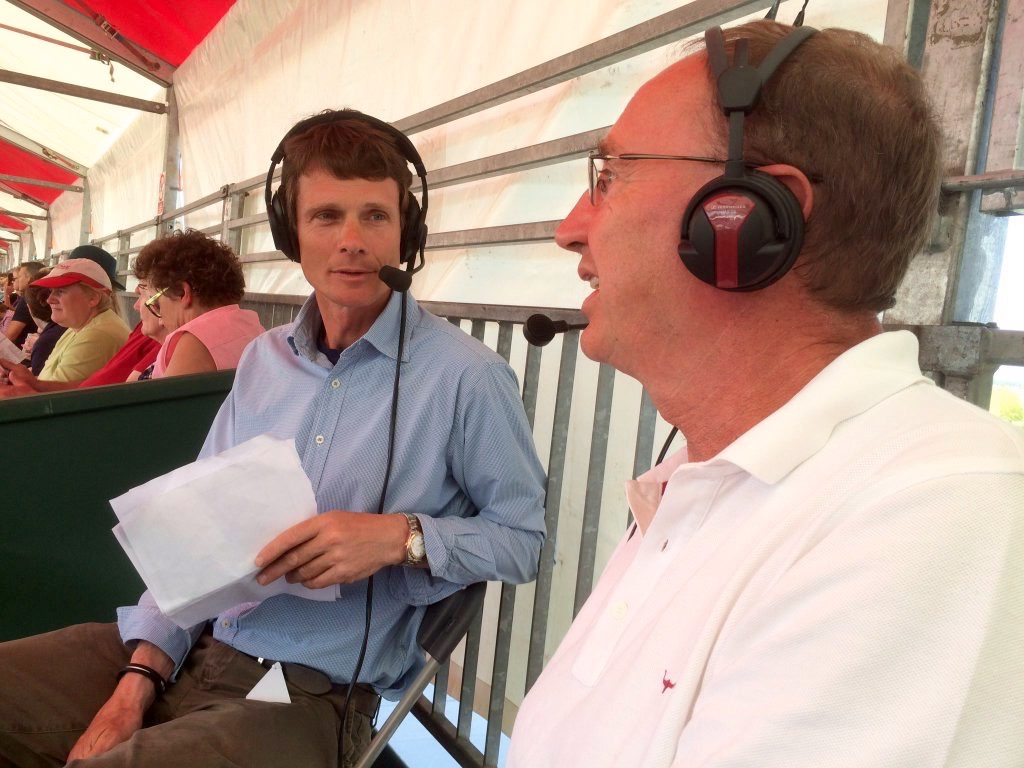
Some background
There is a lot to grasp, and probably the most complicated aspect of covering equestrianism as a complete newbie is the different strands to the sport. In cricket, you just have cricketers . Some might be specialists at one form or the other, but it is pretty much all the same thing. In equestrianism you have three: dressage, showjumping and eventing. It’s like having teams of bowlers, batsmen and allrounders. They have their own separate branches within the British Equestrian Federation so you are dealing with different people all of the time. Obviously the dressage and showjumping specialists perform at a higher level than the eventers, whose horses must be able to do everything, with a gruelling cross-country thrown into the mix. The tallest jump at Badminton was 1.30m, while Scott Brash will be facing 1.60m with a spread of 2.00m. Eventing dressage does not include passage or piaffe, for example.
Eventing first appeared in the 1912 Olympics and was originally open only to male military officers, since the sport was designed to show the three basic requirements of a cavalry horse: discipline on parade (dressage), stamina and courage (cross country) and proof of soundness and fitness at the end (showjumping) In those days, an endurance test of 34 miles was included for good measure. Dressage is defined as the highest expression of horse training in which horse and rider are expected to perform from memory a series of predetermined movements. The turn-out of horse and rider is also important, while showjumping is where the cash is. Top prize money and valuable horses means there is constant buying and selling to the point that one competitor at last year’s Horse of the Year Show told me that he was about to enter the arena on a horse he had never ridden before.
Now we introduce the owners, and the very delicate relationship that exists between them, the riders and the administrators. The best owners are those who buy the horse, support it and the rider enthusiastically and stay in the background. The worst interfere and get in the way. Leading into the Olympics there can be the issue of an owner wanting their horse to win, while not necessarily caring which country it is representing. Somehow they must be kept on side.
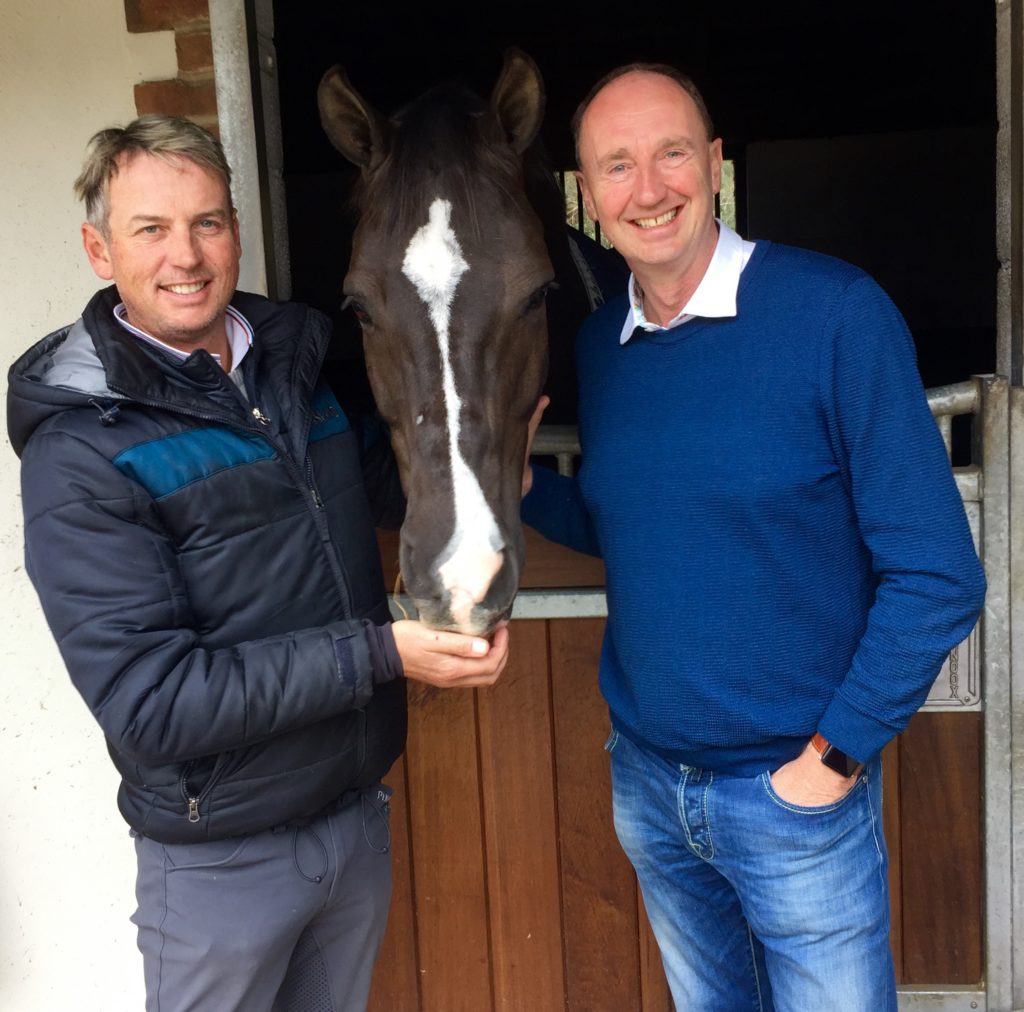 The clock is ticking
The clock is ticking
Back from the World T20 in India, and the realisation that the Olympics is fast approaching. So far I have made some good contacts and received lots of help, but have done only a couple of reports and no commentary. While I was away I found the dressage tests that will be performed in Rio, and was able to watch Charlotte Dujardin and Carl Hester performing them in Olympia, so it is a start. One thing that strikes me is that dressage commentary will be prepared in that I know what they are supposed to be doing, rather than the surprise element of a catch being taken for example – unless the horse goes berserk, or something. I have been calling Emma’s dressage tests (a bit of pressure on there, let me tell you) to the point of understanding the movements and the pace, but I need to get some commentary under my belt.
Time also to meet the main man, Carl Hester and Charlotte, the World and Olympic champion who works and trains at his stables in Gloucestershire and, of course, Valegro. Again, the reception could not have been more kind and hospitable, and this is a report of my visit:
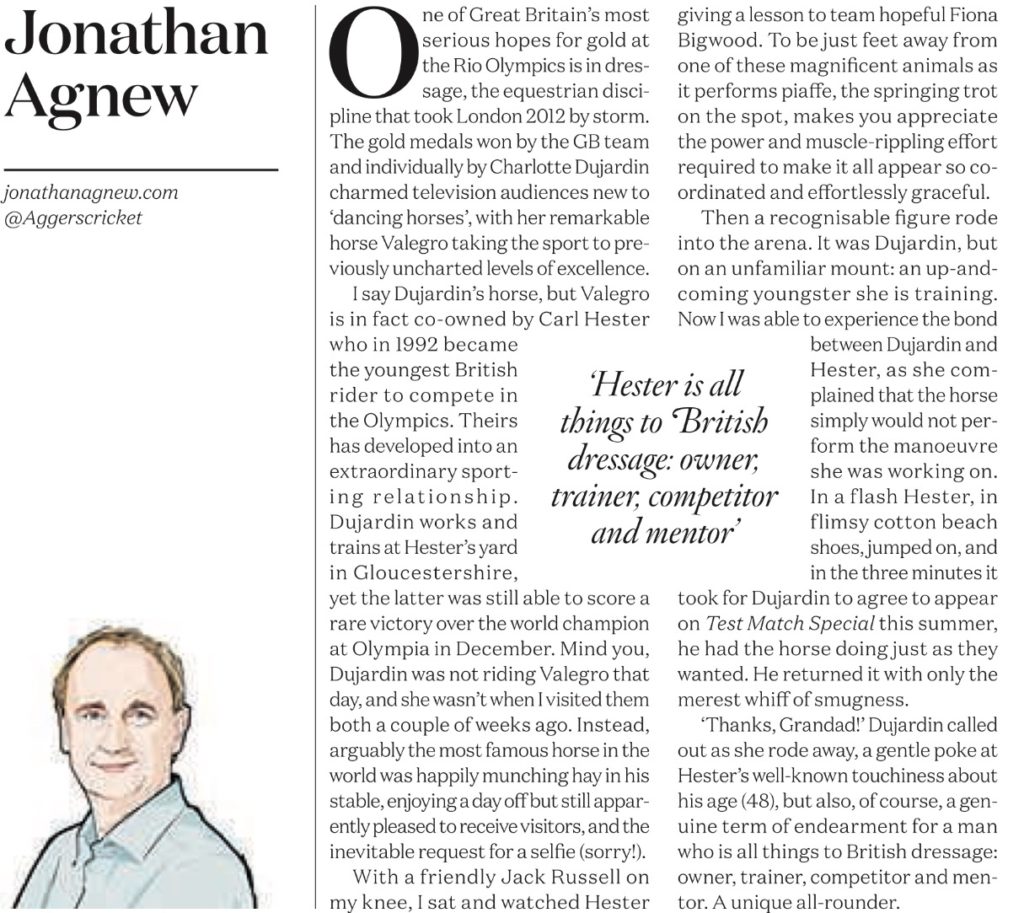
First impressions
What has really struck me about my new sport is the absolutely genuinely warm welcome I have been given by the administrators, the media and competitors. It really has been amazing and, I have to say, a little surprising. I was concerned that there might be an element, at least, wondering what the BBC was doing in getting a cricket person to do this – and at the Olympics, after all. I am pretty sure we in the cricket world would not have been so accommodating, that’s for sure. There, a rather sniffy attitude towards newcomers can be an issue – it is a much bigger media circus, after all, which builds rank and ego. But here I have been encouraged to ask as many stupid questions as I want, and since I have been doing that anyway for 25 years, I have taken the opportunity
There is also the question of how I aim to cover equestrianism. It is, perhaps, a disadvantage to be known for cricket in that no matter how hard I try, I will never convince anyone that I am a qualified horseman, steeped in equestrianism knowledge and experience. And, frankly, I don’t want to. Again, that does not appear to be an issue with the British Equestrian Federation, which seems keen for the sport to be reported in a relaxed and appealing manner. Not many listeners will know a half pass from a counter canter, and while no sport should ever be dumbed down, I am hoping that this is an opportunity to steer away from some of the technical stuff and help grow interest in what is a pretty remarkable sport. The use of the expression ‘Dancing Horses’ is a good example. Before London, this created horror amongst traditionalists in the dressage world. But the description reached out and created interest in the sport. Now ‘Dancing Horses’ is widely accepted and even encouraged.
At the Burghley Horse Trials, I learned how to appreciate the showjumping ‘play off’ on the last afternoon. Michael Jung had to go clear to win, and of course he did. But there was real tension and an excellent commentary opportunity, I thought. At Blair, the weather was awful for the European Games but I walked the cross country course with the designer, Ian Stark and commentator Mike Tucker, who both passed on all sorts of useful info, and I managed a 40 seconds report into 5 Live. At Olympia, it was the big one: presenting the prize to the winner of the Shetland Grand National. It is a brilliant spectacle, small kids clinging to those tiny ponies, little legs going like the clappers. I reckon a fair bit of nipping goes on too. If you haven’t seen one of these races, take a look!
The Beginning
The phone rang. It was my BBC boss.
“Hi Aggers. We don’t need an archery expert in Rio, so I’m afraid you won’t be going.” (I had covered archery in London 2012) Damn, I thought. I rather fancied a trip to Brazil. “Hang on a moment”, he continued. “Is it true that your wife has a horse?” “Stop right there”, I shouted….too late. “Congratulations! You are now the BBC radio equestrian commentator. Good luck!”
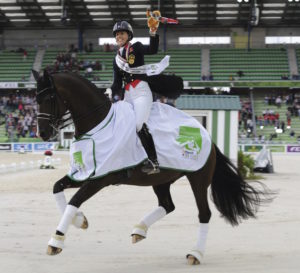 Things happened fast. Soon I was in Caen, watching the World Equestrian Games. Charlotte Dujardin and Valegro won the gold medal and I sat and observed as she halted her lap of honour in front of a large crowd of British supporters, happily waving their flags on the other side of the football stadium. Then it was time for the champions to leave. In a sudden explosion of power, Valegro was on his way, his dark tail flowing spectacularly as they made the most breathtaking of thunderous exits. It was an extraordinary sight and I, a total novice, was blown away. ‘There’s only one thing for it’, I thought to myself. ‘To have any idea how this works, you are going to have to learn how to ride.’
Things happened fast. Soon I was in Caen, watching the World Equestrian Games. Charlotte Dujardin and Valegro won the gold medal and I sat and observed as she halted her lap of honour in front of a large crowd of British supporters, happily waving their flags on the other side of the football stadium. Then it was time for the champions to leave. In a sudden explosion of power, Valegro was on his way, his dark tail flowing spectacularly as they made the most breathtaking of thunderous exits. It was an extraordinary sight and I, a total novice, was blown away. ‘There’s only one thing for it’, I thought to myself. ‘To have any idea how this works, you are going to have to learn how to ride.’
Almost immediately I was aboard Paddy, a huge thing owned by Jo, one of Emma’s friends. The early lessons went pretty well: rising trot and even a nice careful canter on an early hack. My hips creaked a bit, if I’m honest, and I’m not sure if I ever got the positioning of my legs quite right, but at least I was starting to experience some basic level of communication with a horse and a feeling of what it is actually like to ride one, which was what I was after.
Flushed with early success, it was time to move on a stage with some more advanced canter work, involving bridging the reins across Paddy’s neck and lifting myself out of the saddle: a sort of a cruise, by the sounds of it. Unfortunately, things didn’t go to plan. In fact it was a complete disaster as Paddy, full of enthusiasm, decided to bolt. As luck would have it, this entire scene was captured on camera and has proved to be a YouTube sensation. But it didn’t do my pride, my confidence or my back a lot of good.
That was Spring 2015, and it felt as if immediate retirement was the sensible course of action. It was a busy summer, anyway, with the Ashes and so on, so equestrianism took something of a back seat. But Emma’s ‘special’ birthday threw up the intriguing opportunity to go on the riding holiday she has always craved, and for me to ‘man up’ and get back on the horse. So we booked two weeks in Argentina, as you do, including the best part of a week at Los Potreros, near Cordoba; considered to be one of the best riding estancias in Argentina. (Here’s my Mail on Sunday review) This was riding ‘western style’, one-handed just like the cowboys – or gauchos, in this part of the world. And how much easier I found it. Saddles swathed in sheepskin and riding in jeans: this was the way to go and in Tango, a little Argentina criollo, I found my perfect partner.
So confidence restored and no broken bones, I am back on the horse again. More of that to come. Also meeting the top riders, my new colleagues in the equestrian media and getting on the air.
